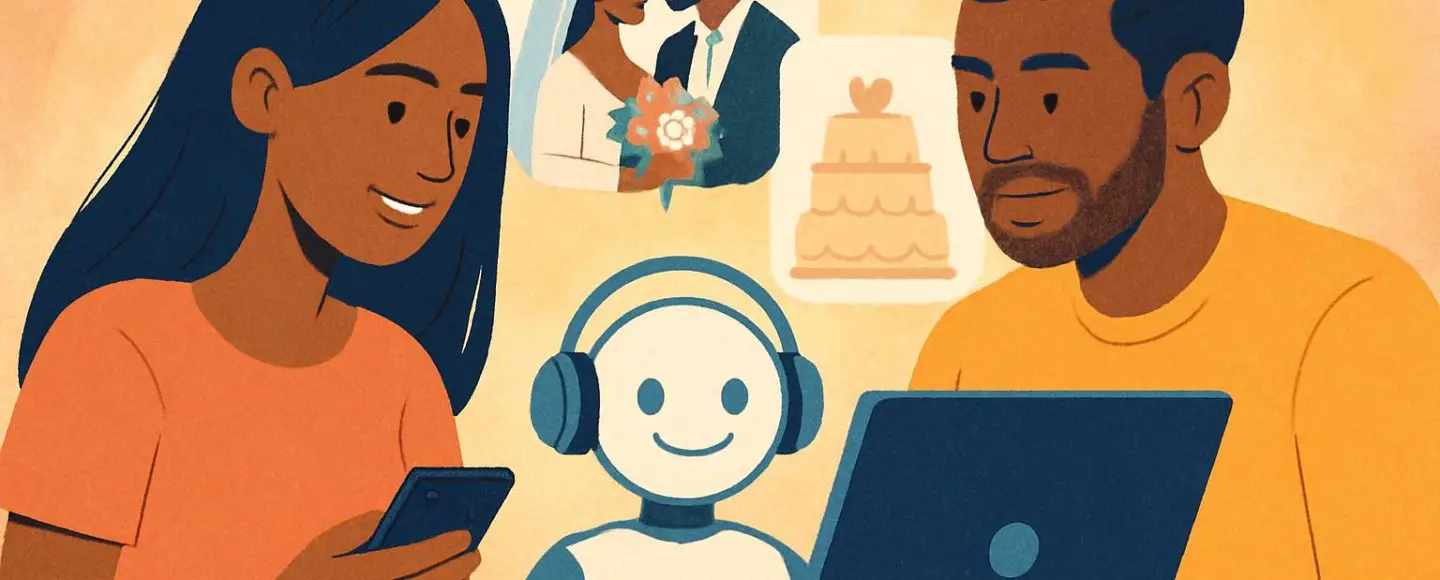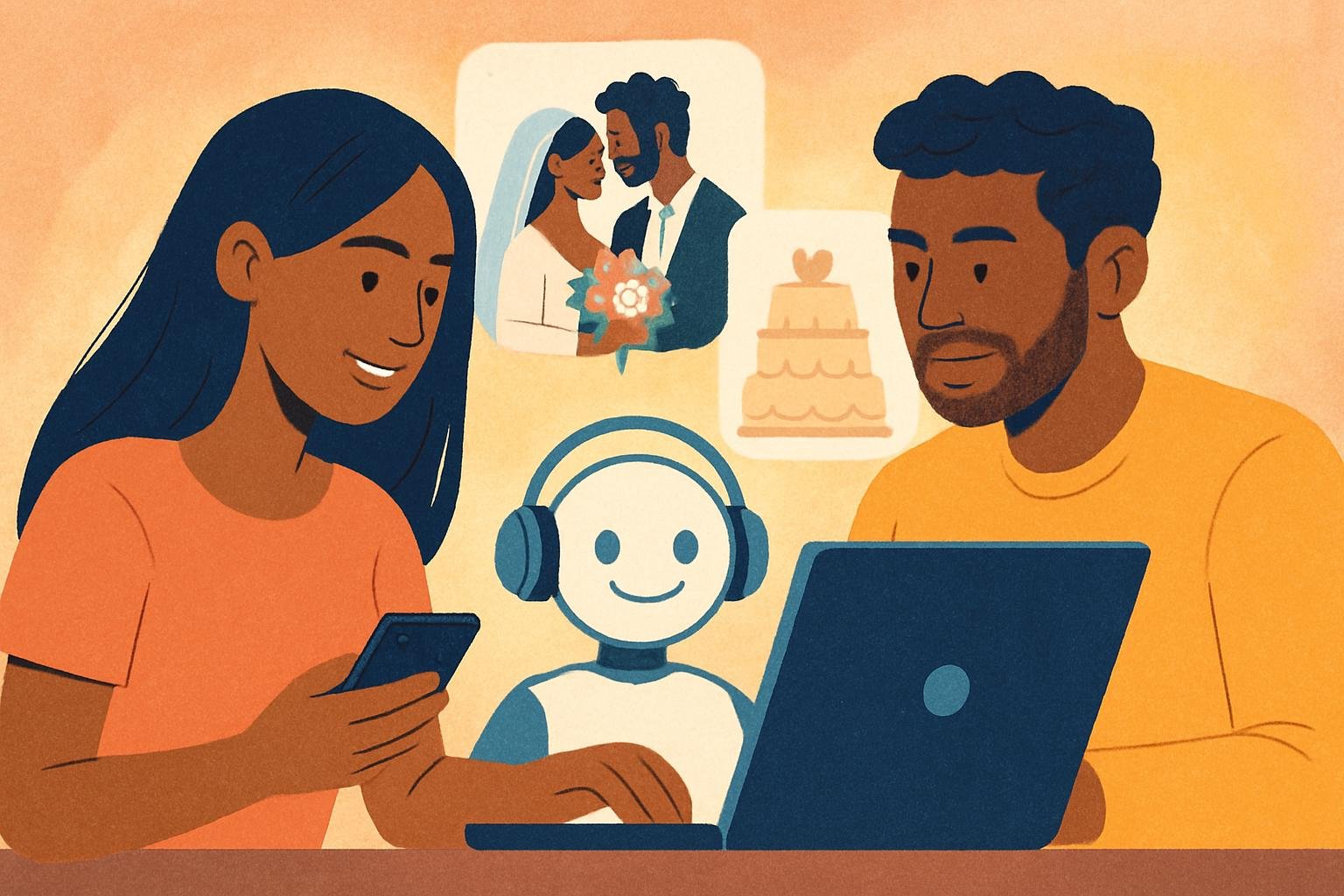
Gen Z Wedding Planning Meets AI
The rise of generative AI tools is transforming major life milestones. Gen Z Wedding Planning Meets AI captures a significant shift in how love intersects with technology. As digital natives reach the age where marriage becomes a focus, they are reinventing the traditional wedding process by blending creativity with efficiency using tools like ChatGPT, Midjourney, and Canva AI. These platforms help with crafting vows, creating invitations, assembling registries, and managing vendors. By merging custom tech solutions with heartfelt moments, this article explores how Gen Z uses artificial intelligence to streamline wedding planning, make emotional decisions easier, and reshape the meaning of a modern wedding.
Key Takeaways
- AI wedding planning is increasingly popular among Gen Z couples who prefer digital tools for customizing their events and saving time.
- Commonly used tools include ChatGPT for writing vows and speeches, Midjourney and Canva AI for visual designs, and platforms like Joy and Zola for planning assistance.
- AI lowers costs and increases efficiency but introduces questions about cultural sensitivity, ethics, and emotional authenticity.
- Experts recommend using AI thoughtfully, ensuring personal stories and emotions remain central to the wedding experience.
Why Gen Z Is Turning to AI for Wedding Planning
A 2023 Pew Research report shows that over 93% of Gen Z adults use the internet daily. More than half have experimented with AI tools since 2022. This digital fluency makes them early adopters of AI-driven wedding planning. For this group, weddings are not only ceremonial but also viewed as carefully managed projects. Many prefer solutions that are flexible and efficient.
Traditional options are often seen as outdated, slow, or too expensive. AI tools, on the other hand, offer faster processes, complete customization, and lower costs. ChatGPT can compose beautiful vow drafts in seconds. Midjourney personalizes invitation designs based on visual themes. AI-based platforms also make collaboration easier, reducing wait times and misunderstandings among partners, families, and vendors.
These tools are helping Gen Z couples tailor every aspect of their wedding to reflect their unique style and story:
1. ChatGPT: Writing Vows, Speeches, and Ceremony Scripts
ChatGPT serves as a creative writing partner for many couples. By entering prompts like “a heartfelt vow with humor” or “a funny but touching maid of honor speech,” users receive a draft that can be refined to match their tone. It helps spark ideas when couples feel stuck, offering structure without removing personal meaning.
2. Midjourney and Canva AI: Custom Invitations and Decor Design
Midjourney allows for the design of personalized visuals such as invitation artwork, aisle decorations, and even signage. Canva AI aids DIY efforts with intelligent template suggestions and creative layouts. These platforms remove the need for agency support and give couples full design freedom at a lower cost.
3. Zola, Joy, and Appy Couple: All-In-One AI Planning Platforms
Integrated planning software is becoming standard. Zola’s AI assistant allows for budget tracking and customized checklists. Joy can suggest registry items based on lifestyle preferences. These tools reduce decision fatigue and give couples more control over their wedding processes.
4. AI Voice Tools: Narration and Audio Keepsakes
Some couples are using AI-generated voices for creative audio elements. These include narrations of their love story or themed voice guides for guests. These formats offer a fun and interactive way to personalize the wedding experience, keeping guests entertained from start to finish.
The AI Advantage: Efficiency and Cost Control
The Knot’s 2023 Real Weddings Study places the average wedding cost at around $30,000. AI tools can reduce this significantly. By generating speeches, creative assets, and schedules at home, couples avoid costly expert fees. Planning steps that once took weeks can now be covered in a few hours through AI-powered systems.
Here is a comparison between AI-assisted and traditional methods:
| Aspect | Traditional Planning | AI-Assisted Planning |
|---|---|---|
| Average Cost | $30,000+ | $15,000–$22,000 |
| Planning Hours | 250–300 hours | 80–120 hours |
| Customization Level | Moderate (vendor limits apply) | High (multiple digital variations) |
| Emotional Input | Handwritten, time-intensive | AI-assisted with personalized editing |
Debating Emotional Authenticity and Ethical Boundaries
Some professionals are warning that automating wedding elements might strip away emotional warmth. Psychologist Dr. Marla Jensen explains that AI may help structure content but cannot truly replace feelings rooted in real experiences.
Wedding planner Amelia Strauss adds that while AI-generated vows can be useful, couples should take the time to personalize their words. Vows copied directly may sound generic or lack emotional weight.
There are also ethical concerns. AI-generated scripts may include biased language or culturally insensitive remarks. When planning multicultural events, AI must be used with care, especially when constructed phrases might not honor traditions correctly.
Global and Cultural Perspectives on AI Wedding Planning
Beyond the United States, couples in other parts of the world are exploring AI in their ceremonies. In India, some families use AI for multi-day events by supporting planning in Hindi and curating custom dance sequences for sangeet events. In Japan and South Korea, local platforms provide chatbot services to assist with planning and handle tasks such as guest coordination or crafting formal greetings in different dialects.
These features highlight AI’s growing ability to blend cultural norms into digital projects. Although challenges remain, such as maintaining accuracy in honoring specific customs, couples are embracing AI as a supportive layer rather than a replacement for tradition.
Expert Opinions: Where to Draw the Line
Tech ethicist Jelani Moore suggests a responsible approach using this framework:
- Authenticity Check: If a tool replaces a central ritual entirely, it should be re-evaluated.
- Bias Review: Review content carefully for tone and cultural fairness.
- Transparency: Be open about AI usage, especially when sharing content publicly.
The final message from wedding experts is clear. AI is an efficient assistant with creative potential. Still, the heart of the wedding should come from the couple’s own words and shared vision.
Mini FAQ: AI and Wedding Planning
Q: Can ChatGPT write effective wedding vows?
A: Yes, when guided with strong prompts. Couples often use it to create an outline or find the right tone, then revise it to reflect their story.
Q: Which are the best AI wedding planning tools?
A: For Gen Z couples, top tools include ChatGPT, Midjourney, Canva AI, Zola, and Joy. These platforms help with everything from speeches to seating arrangements.
Q: Is AI replacing wedding planners?
A: Not entirely. AI supports simple tasks, but emotional insight and hands-on experience from planners are still important.
Q: Can AI help with culturally specific weddings?
A: Yes, in many cases. Tools are improving in language and cultural understanding. Still, human oversight remains essential to stay respectful and accurate.
Weddings may be deeply rooted in tradition, but they are also evolving with the help of technology. Some couples are even experimenting with AI-powered romantic storytelling to enhance their relationship journeys. Whether it is creating vows or imagining personalized decor, AI now plays a clear role in defining what love and connection look like in the digital age.
Conclusion
Gen Z’s embrace of AI in wedding planning marks a transformative shift in how celebrations are designed and personalized. They leverage tools for mood board creation, vendor matchmaking, and even AI-generated vows, achieving both efficiency and unique self-expression. As intelligent algorithms curate tailored ideas and streamline logistics, couples enjoy more thoughtful and stress-free planning. This integration not only reflects Gen Z’s comfort with emerging technologies but also signals a future where AI acts as a creative collaborator, empowering them to craft meaningful, modern ceremonies.
References
Brynjolfsson, Erik, and Andrew McAfee. The Second Machine Age: Work, Progress, and Prosperity in a Time of Brilliant Technologies. W. W. Norton & Company, 2016.
Marcus, Gary, and Ernest Davis. Rebooting AI: Building Artificial Intelligence We Can Trust. Vintage, 2019.
Russell, Stuart. Human Compatible: Artificial Intelligence and the Problem of Control. Viking, 2019.
Webb, Amy. The Big Nine: How the Tech Titans and Their Thinking Machines Could Warp Humanity. PublicAffairs, 2019.
Crevier, Daniel. AI: The Tumultuous History of the Search for Artificial Intelligence. Basic Books, 1993.


